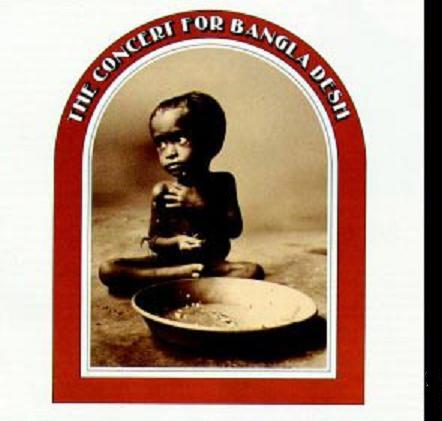
The Concert for Bangladesh (1971)

Disc One
1. George Harrison/Ravi Shankar
Introduction
2. Bangla Dhun (Ravi Shankar)
3. Wah-Wah
4. My Sweet Lord
5. Awaiting on You All
6. That's the Way God Planned It
(Billy Preston)
7. It Don't Come Easy (Ringo Starr)
8. Beware of Darkness
9. While My Guitar Gently Weeps
Disc Two
1. Medley:Jumpin'Jack Flash/Young Blood (Leon Russell)
2. Here Comes the Sun
3. A Hard Rain's A-Gonna Fall (Bob Dylan)
4. It Takes a Lot to Laugh,
It Takes a Train to Cry (Bob Dylan)
5. Blowin' in the Wind (Bob Dylan)
6. Mr. Tambourine Man (Bob Dylan)
7. Just Like a Woman (Bob Dylan)
8. Something
9. Bangla Desh
It is difficult now, in an age saturated with celebrity charity events and musical telethons, to recall just how singular The Concert for Bangladesh truly was. Long before Live Aid, Farm Aid, or the saccharine global chorus of We Are the World, George Harrison—Beatle turned humanitarian—gathered a veritable pantheon of musicians at Madison Square Garden for a cause far removed from the limelight: famine and war in a little-understood corner of South Asia.
Technically, this was not a George Harrison solo album in the conventional sense. The stage is shared too widely, the spotlight passed too generously. But Harrison, instigator and anchor of the event, performs enough and presides with such clear-eyed purpose that his imprint remains unmistakable. It is, for better or worse, his show.
Another triple album—his second in succession—it begins not with music but with a moment of stillness. Harrison, soft-spoken and sincere, explains to the enormous New York audience the purpose of the night before ceding the stage to Ravi Shankar. It is a bold move: the entire first side is devoted to Indian classical music. The crowd, eager but uninitiated, applauds the tuning up, mistaking it for the performance itself. Shankar gently encourages them to “try to get into it.” Some do.
When Harrison finally takes up his guitar, the shift in energy is immediate. He performs a suite of songs from All Things Must Pass, rearranged out of necessity—Phil Spector’s massive production could not be replicated live, nor should it have been attempted. Stripped of their layered studio sheen, the songs feel rawer, more human, less mythic. Interspersed are selections from his Beatles years—While My Guitar Gently Weeps among them—a clear nod to the audience’s expectations, if not his own artistic evolution.
The remainder of the set is a varied affair. Billy Preston contributes a rousing, if stylistically incongruous, gospel-tinged That’s the Way God Planned It. Leon Russell offers a rollicking medley capped with an unexpectedly effective Jumpin’ Jack Flash. Ringo Starr, game but uncertain, tackles It Don’t Come Easy with more enthusiasm than polish. His inclusion is sentimental, rather than musical, but the crowd is forgiving.
Then comes the moment.
Bob Dylan—absent from the public stage for what felt like years—emerges to a roar that leaves no doubt: the secret was out. His five-song set, performed with that brittle poise only Dylan can summon, is not just a highlight; it is a reclamation. For many, his appearance alone elevated the event from a worthy concert to a moment of rock history.
Harrison closes with Bangla Dhun, a final gesture of musical and moral solidarity. The curtain falls not with fanfare, but with a sense of quiet accomplishment. This was not a self-congratulatory gala, nor an exercise in empty celebrity. It was, at its core, a gesture of compassion—grand in scale, sincere in spirit, imperfect in execution, but deeply human throughout.
A milestone not just in Harrison’s career, but in popular music's capacity for empathy.
Go back to the main page
Go To Next Review